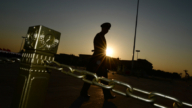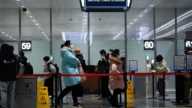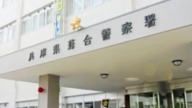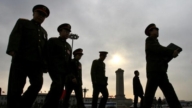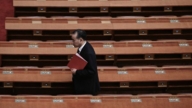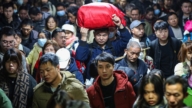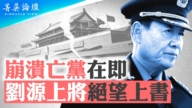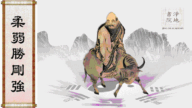【新唐人2013年04月20日讯】4月18号,中共中央财政部公布了2012年“三公经费”预算执行情况和2013年“三公经费”预算资料,中国特色“三公经费”,这一个长期受世人诟病的话题再一次引发公众关注。评论指出,中共的预算历来都是超标的。另外,还有多少“三公经费”的金额处于预算外的灰色地带,依然让人琢磨不透。所以,中共公布“三公经费”的预算,其实是一种骗术。
中共中央财政部向社会公布的,2012年“三公经费”预算执行情况和2013年“三公经费”预算资料显示,2012执行比预算增长1.11亿元,与2012年预算执行数相比,2013年中央本级预算“三公经费”减少1.26亿元。
公民监政会发起人郭永丰:“骗人的,它就是一个祸国殃民的政府,铺张乱费的政府,它就是拿纳税人的钱树立个人形象的政府,谎言政府,老百姓已经看透了,在我们大陆不腐败都是新闻了,腐败都是正常的。”
中国金融智库研究员巩胜利:“中国的预算,历来的预算都是超标的,计划,中国历来都是流于一种形式,是做给老百姓看的,其实还有一点,因为中国政府它是属于7级构架,中央政府最多只能管到省一级。都是官方根据它自己的需求来发布它自己的。”
中国金融智库研究员巩胜利告诉《新唐人》,省级以下的三公消费都是中央计划之外的,中央根本管不了,也没在财政预算之内。巩胜利还指出,中国是党和政府同时运行,共产党的运行是绝对保密的,所谓公布出来了的还只是政府的预算,而共产党的开销还要远远大于政府。
那么世界上其他国家的“三公经费”的情况是怎么样的呢?
美国南卡罗莱纳大学艾肯商学院教授谢田:“如果美国国会没有批准的预算,美国政府就没有钱,很多政府部门就要关门,当然很多的关键部门不会关门,它每一分钱都是国会批准的,美国的州政府,市政府根本就没有三公消费的概念。”
美国联邦的公车消费也管的很严,公车决不能用来干私事,比如从家里到上班这段路程。官员只能开私家车或许坐地铁上下班。
美国南卡罗莱纳大学艾肯商学院教授谢田指出,美国政府的实际开支如果超出预算,美国国会允许它在一定范围之内发行国债,但发行国债限制得极其严厉,也往往成为非执政党指责的焦点。
谢田:“中国没有这个限制, 要发多少国债,把老百姓银行的钱要拿多少出来投资,甚至多印多少钞票,全都是中央政治局那几个人说了算,那实际上他们根本不在乎通货膨胀的影响,也不在乎中共官员利用通货膨胀来大势搜刮老百姓的钱财。”
对比中共官员们奢靡的“三公经费”,反观大陆底层百姓,他们吃饭都成问题。
郭永丰:“哎呀,老百姓很艰难,反正是吃了上顿没下顿,一天不干活,一天就没饭吃,从早上忙到晚,不停的忙不停的干,不忙不跑就没吃的没喝的了,所以说老白姓也绝望了。”
针对目前中国因为禽流感而大量捕杀家禽,谢田观察,通货膨胀将会加快,权贵阶层高枕无忧,而普通百姓又会再一次承受通货膨胀带来的恶果。
北京大学教授王锡锌,根据中共中央党校的《学习时报》报导的内容,曾经做客中央电视台《新闻1+1》时说,中共的“三公经费”达到9000亿……相当于财政支出的接近30%。
有评论指出,全国一年的“三公经费”竟然“吃掉”30艘航母,把“三公经费”的钱多造点武器装备,多买点校车,真真切切的为强国利民做点事比什么都强!
采访编辑/刘惠 后制/孙宁
China Releases “Three Public” Spending Budget
On April 18, China’s Finance Ministry released the 2012
actual expenditure on “three public” spending, and the 2013 budget.
Over the years, “three public” spending has garnered
public criticism, and has now become a public focus again.
Commentators say that the Chinese Communist Party(CCP)
authorities have always overshot their budgets.
And that much of the “three public consumptions” are still
hidden from the public.
Thus, the CCP’s official budget on “three public” spending
is actually a hoax.
China has released the actual “three public” spending figure
in 2012 and the 2013 budget.
In 2012, the actual expenditure overshot its budget
by 111 million yuan.
The released 2013 budget is 126 million yuan less than
the 2012 expenditure.
Guo Yongfeng,founder, Chinese Citizen Watchdog:
“It’s deceitful.
It is a prodigal government, a lying government, and
deft at lavishing taxpayers’ money on glorifying its own image.
Civilians have come to understand it now.
Today, only lack of corruption is worth reporting in China,
whilst corruption is too common to be newsworthy. ”
Gong Shengli, China’s Financial Think-Tank researcher:
“In China, the annual official budgets have always
Overshot their limits.
They have used related data as a mere formality,
a show for citizens.
China’s government is comprised of seven layers,
its central authorities can only reach down to the provincial level.
Usually, local authorities issue their own data.”
Gong Shengli reveals that three public spending for
authorities below provincial level is outside the state budget.
He says that in China, the financial budget is used by
the Party and by the government.
How much the Party has used of the budget
is absolutely confidential.
The officially released budget on three public spending is
only for the government,
the Party’s own budget
is far greater than that.
Is there such a thing as “three public” spending
in other countries?
Xie Tian, Professor of University of South Carolina-Aiken:
“The US government won’t get the money asked for if
Congress doesn’t pass the budget.
Some unimportant state departments
could even be closed if expenditure was not agreed.
Every penny that the US government uses is subject to
congressional approval.
For the US state governments and city halls, there doesn’t
exist a notion of three public spending.”
The U.S. has strict rules on the use of official cars,
which are not available for private use.
For example, an official can only drive his own car or
take the subway for the journey from home to work.
Xie Tian explains that if the U.S. government’s
actual expenditure exceeds its budget,
The Congress would allow it to issue limited-scope
treasury bonds.
He says that the issuance is severely restricted,
and often becomes a target of non-ruling parties’ criticism.
Xie Tian: “There isn’t such a restriction in China.
How many treasury bonds can be issued,
how much money to be taken out of banks for state
investments, and how many extra currency notes to be printed,
only a few top CCP leaders have the final decision.
So they actually don’t care
what the impact of inflation will be.
Neither do they care if CCP officials plunder
ordinary folks’ wealth through inflation.”
In sharp contrast, China’s grassroots citizens are still
leading hard lives.
Guo Yongfeng: “Ordinary folks’ lives are quite difficult.
It’s no work – no meal, so they have to work day and night.
They already feel there is no hope.”
Due to the bird flu threat, lots of poultry has been killed
in China recently.
Xie Tian speculates that the country’s inflation
will pick up speed .
It won’t impact the ruling class’ easy living, but once again,
it will negatively affect civilians’ daily lives.
Once, in an interview with CCTV, Wang Xixin,
professor at Peking University, revealed an official figure on “three public” spending.
It was 900 billion yuan, nearly 30% of the
total state budget of that same year.
Media commented that the three public spending
can “eat up ” – cover the cost of 30 aircraft carriers yearly.
If this money can be used to buy more weapons
and more school buses,
isn’t that the most meaningful thing to
strengthen the nation and benefit it’s people?





